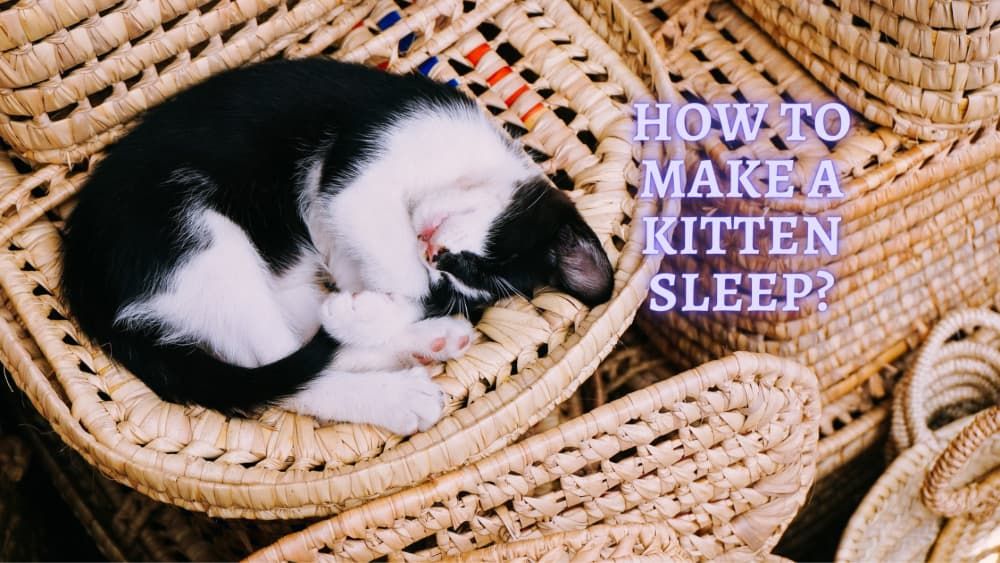How to Make Kitten Sleep?
Written by:
Author: Vicki Smirnova
Vicki Smirnova is a professional writer and editor who adores animals and helps readers get along well with their pets. She has been working in digital media for more than 5 years and has great experience writing content about lifestyle, including pets. Vicki specializes in dog health and nutrition, cat feeding, dog training. She is an aquarium lover and is passionate to write about fish care at home. Also, Vicki headed several websites and worked as a news editor.
View all 244 articlesLearn about our editorial process and veterinary review board.
Reviewed by:
Veterinary review
by Dr. Chyrle Bonk
Dr. Chyrle Bonk is an associate veterinarian since 2010 and was a volunteer for Clearwater County Youth 4H. Dr. Bonk contributed to various animal and veterinary related websites and magazines as a way to help keep animals across the globe safe and healthy. When Chyrle not working she spends her time with her own furry crew of dogs, cats, and horses.
View all 10 articlesLearn about our veterinary review board
Viewed: 467
Updated on: 01/24/2023
Cats are predators by nature, typically hunting for food at night. Even though your housecat doesn’t need to hunt for food, that nocturnal activity is an engrained and absolutely natural behavior. So, when your kitten attacks your feet or slippers in the dark, they follow their instincts.
Training a cat to a daily human routine is possible, and cats often get used to it independently. If your cat wants to avoid coming around to your schedule, then something went wrong. Cats often want to avoid sleeping at night due to insufficient daily activity. Some pets do not see their owner all day and may want to chat and play when the owner comes home, even if they’re trying to sleep. The opposite situation is also possible- the cat may not be comfortable in the noise and hustle of the day and may be more comfortable walking around the house at night.
A pet may also interfere with your sleep due to the restriction of their territory at night. For example, during the day, a cat may be allowed free reign of the entire apartment, while the bathroom may be closed off at night. This situation causes a fuzzy experience, and a pet may interfere with your sleep intentionally.
How to get a Kitten to sleep at night?
What if a cat interferes with sleep at night? Can you conquer nature and adjust the cat’s waking rhythm to suit yourself? Yes, you can. If your favorite pet regularly disrupts your sleep, then you can train them to sleep at night using the following tips:
1. Organize your daily routine and strictly follow it
Kittens, like children, respond well to a regular routine of things. The organization of a permanent regime is the first step in teaching your pet to sleep at night.
Stick to a consistent bedtime ritual. Cats are socialized animals, so they need to receive signs of attention and love from their owners. Try to get up and go to bed simultaneously every day. Then the kitten will be able to get used to your regime and try to wake up and fall asleep at the same time as you.
Turn off the lights at a specific time in the evening. Darkness is a crucial indicator for pets, telling them that it’s the moment to relax, settle down next to you and fall asleep. However, do not forget that cats also like to hunt in the dark, so the darkness does not make them sleepy.
Cats typically do very well when they live on a stable schedule and can rely on sure signs in their environment. If you sleep with the light, remember to turn it off at night. If you turn off the TV before bed, always do so. If you turn on the fan at night, remember to turn it on. Always create the same environment before going to bed. By regularly repeating these reliable signs, your pet will begin to learn about the onset of time for sleep.
2. Providing playtime for the cat during the day
Try to make sure that your cat gets plenty of exercise and activity during the day. This is especially true if you are at work until the evening, and the kitten is bored alone. Without stimulation, your kitten may choose to sleep all day while you’re away and then expend energy in the evening and night while you’re at home. If you provide your pet with entertainment for the period when you are at work or school, they will most likely not need your attention in the middle of the night. Cats need communication, so you should pay attention to your pet. Even if you come home late at night, chat with your pet, stroke, talk, and give them a treat.
It is necessary to ensure that your kitty is active and engaged while no one is at home. Try interactive toys, food puzzles, or install reliable shelves that the cat can climb. It is advisable to keep several sets of toys that can be changed at intervals of 3-5 days so that your cat won’t get bored with them. You can hide dry food in toys or just put it in different corners of the apartment to encourage your cat to actively search for them during the day. There are unique store-bought toys, from which food is poured out if they are actively moved and thrown.
3. Communication with wildlife
Cats love to observe the outdoors from a window. You can hang a bird feeder on or near their favorite lounging spot and install a perch for your pet to safely sit on to watch the goings-on outside. Ideally, the bird feeder should be located near natural areas of shelter for birds, such as trees and bushes, in which the birds feel quite safe.
Important! The feeder should be located no closer than 3 feet to the window. This will help protect the birds from hitting the glass.
READ MORE: Cat Sleeping Positions
4. Make your cat tired in the evening
Interactive evening games are a great way to spend your cat’s extra energy before going to bed. In the evenings, you can also show them unique videos of cats from the internet, where a squeaking mouse, fly, or fish moves across the screen — the animal will try to catch them. You can put the tablet down and start a unique video game for the cat, then the virtual hunt will be even more exciting — the pet will touch the mouse with its paw, and the mouse will disappear. You can also use interactive toys to play with them or just give them attentive strokes and cuddles.
If your pet still doesn’t let you sleep at night, deliberately wakes you up, meows, asks you to open the door but doesn’t go inside, drops items in the kitchen, most likely, it just doesn’t have enough attention, and the cat is trying to establish at least some contact with you. Talk to the animal when you go to work and come back, play, let them watch your household chores, comb your fur, and show them that you have an emotional connection with them.
If, on the contrary, it is too noisy at home during the day, for example, there are children playing or there are other animals around, a timid cat can hide in a corner and sleep because it does not have the opportunity to explore the territory. In this situation, your pet will be happy to walk around the apartment at night, in silence and alone. A cat may even mark their possessions. You need to reconcile the cat with reality, ask the children to include it in their games, and give them a comfortable opportunity to move freely around the apartment.
5. Change your kitten feeding schedule
The time at which your cat eats will significantly affect their sleep mode. Often cats annoy their owners at night or early in the morning simply because they are hungry. If you correctly change the diet and feeding time, a pet will not be so noisy at night.
Try feeding your cat just before bedtime. Absolutely everyone likes to sleep after a hearty meal. According to many observations, a pet will be calm, full, and happy all night if you them a meal before going to bed.
Spend money on an automatic feeder so that the morning feeding does not cause you unnecessary trouble. Automatic pet feeders that deliver a portion of dry food strictly at certain times of the day can be ordered online or purchased at major pet stores. If your pet regularly wakes you up in the morning with a request to feed it, then you will be saved by an automatic feeder. Moreover, cats tend to experience anticipation. When your cat knows from experience that they will soon have breakfast, most likely your pet will be next to the feeder and not interfere with you in the bedroom.
It is essential not to react to provocations. If your cat does not let you sleep at night and requires attention, and you are sure that they aren’t ill, stressed, or hot, ignore their antics and do not give in to manipulation. In the daytime, on the contrary, actively communicate with the pet. It is essential not to give up at night. If you ignore the cat’s demands for a few days and then suddenly react violently to a dropped object, this will only reinforce the undesirable behavior.
What you can’t do to make a cat sleep at night?
Many people wonder if I put my kitten in a cage at night. No, it is not recommended to close the kitten in a cage or even indoors at night. If the pet had access to these territories during the day, the cat may want to regain control over them at night instead of sleeping. If you have a small child in your apartment who is disturbed by a cat at night, it is better not to allow the pet in the nursery during the day so that the cat simply excludes this territory from the list of its own. Or make the child’s bed inaccessible to the cat if he does not have a separate room.
READ MORE: Best Cat Cages
If possible, also lock your bedroom during the day. Cats are known for being challenging to fall asleep with, as they are rarely able to sleep for 8 hours in a row and tend to bite and scratch unexpectedly if they are accidentally scared by their owner moving in their sleep. It’s best to keep your pet out of your bedroom and let them know that your room is not their territory.
If following these important recommendations does not bring the desired result, consult with an animal behaviorist. Perhaps the pet is experiencing severe stress and can not sleep because of illness or excessive or insufficient nutrition.
You can scare the cat away from your bedroom door. If a pet is trying hard to get into your bedroom at night, there are several ways to wean it from this behavior. Create some inconvenience to the pet or even scare it, then the cat will most likely no longer want to meow and scratch under the door.
Put a scratchy plastic mat or sheet of foil in front of the bedroom door, or stick double-sided tape on the floor. The unpleasant texture of the floor covering near your bedroom door will make your cat less likely to bother you at night.
READ MORE: The Best Pet Carrier for Cats
FAQ
How do I get my kitten to settle down at night?
For your kitten to sleep well at night, you need to tire it out during the day. Cats are predators by nature, and they love to explore scratch, and hunt. You must provide your kitten with entertainment and play during the day and evening. It is also advisable to feed your kitten right before bed at night so that it does not experience hunger before morning.
What do you do with a kitten at night?
Do not block the kitten from the bathroom or kitchen at night if these areas were accessible to it during the day. The cat will try to regain control of them at night instead of sleeping. You can provide them with a comfortable bed in other rooms of the house and encourage them to sleep there during the day as well.
Can I put my kitten in a cage at night?
Cats are naturally freedom-loving and need open space. The animal will feel restless in a closed area.
How do you calm down a hyper kitten?
Small kittens are very active, and this is normal. Kittens have a lot of energy that they need to release. Interactive toys with lots of attention or a kitten companion are ideal for this purpose.
 Kitten Care Why Do Kittens Bite? Reasons Why Do Kittens Bite And Ways To Stop Your Kitten Biting You
Kitten Care Why Do Kittens Bite? Reasons Why Do Kittens Bite And Ways To Stop Your Kitten Biting You - 176
- 0
 Kitten Care How Do I Introduce My Cat To A New Kitten? 7 Steps To Introduce Cats to Each Other
Kitten Care How Do I Introduce My Cat To A New Kitten? 7 Steps To Introduce Cats to Each Other - 97
- 0
 Kitten Care How To Get Rid Of Fleas On Kittens? Ways to Treat and Prevent Kitten Fleas
Kitten Care How To Get Rid Of Fleas On Kittens? Ways to Treat and Prevent Kitten Fleas - 142
- 0
 Cat Care Why Does My Cat Attack My Legs? 10 Reasons Why and What To Do About It (Vet-Approved Advice)
Cat Care Why Does My Cat Attack My Legs? 10 Reasons Why and What To Do About It (Vet-Approved Advice) - 46013
- 21
 Cat Veterinary Tips Cat Stomach Gurgling: Vet Advice on Why is Your Cat Stomach Gurgling?
Cat Veterinary Tips Cat Stomach Gurgling: Vet Advice on Why is Your Cat Stomach Gurgling? - 36469
- 4
 Cat Veterinary Tips My Cat Lost its Voice: Can Cats get Laryngitis? (Vet Advice)
Cat Veterinary Tips My Cat Lost its Voice: Can Cats get Laryngitis? (Vet Advice) - 23554
- 13






















